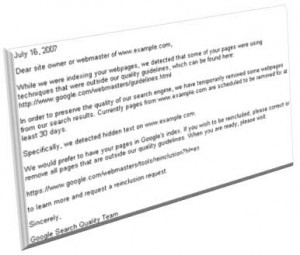 Receiving a penalty from search engines, particularly Google, is one of the greatest fears of webmasters. Penalties mean a demotion in page rankings, reduced to zero visibility on search engine results pages, and deterioratingorganic traffic (which would later on result to falling conversions and income), among others.Sometimes, when a website is given a penalty, the webmaster will receive a notification in the Message Center of his Google Webmaster Central account.
Receiving a penalty from search engines, particularly Google, is one of the greatest fears of webmasters. Penalties mean a demotion in page rankings, reduced to zero visibility on search engine results pages, and deterioratingorganic traffic (which would later on result to falling conversions and income), among others.Sometimes, when a website is given a penalty, the webmaster will receive a notification in the Message Center of his Google Webmaster Central account.If Google doesn’t spell it out for you (and it’s possible that they wouldn’t go into the minute details of your violations anymore) or if you don’t have an account in Google Webmaster Central, take a look at this list of common violations and see if you have inadvertently done something you didn’t know was a no-no:
Regarding Content:
1. Stuffing keywords into your articles and website content.
2. Cloaking, or presenting search engine crawlers with content that’s different from what regular visitors see.
3. Publishing mediocre, gibberish, irrelevant, and worthless content.
4. Publishing duplicated or scraped content.
5. Making use of doorway pages.
Regarding Links:
1. Having paid links.
2. Hiding links (which is often done by using the same color for the text and page background)
3. Participating in link networks.
4. Accepting backlinks originating from link farms.
5. Using grammatically incorrect keywords as anchor texts in article submissions.
6. Using JavaScript to hide links and redirect visitors.
7. Directing visitors to malware-infested pages.
8. Being linked with “bad neighborhood” sites.
9. Running automated queries.
If you have done any of these things, don’t be surprised if you end up getting penalized and excluded from Google indexing. Remember as well that it’s possible for Google to penalize only specific pages in your website. The extent of your usage of black-hat strategies is not the issue, but the mere fact that they are being done is what raises red flags for Google.
Innocents (or Not) Get Axed Too
There are cases though wherein Google accidentally penalizes websites that have always operated by the book and whose webmasters have always donned the proverbial white hat.Question is, are you truly an innocent and unfortunate bystander?
If you really have not committed any of the violations listed in the Webmaster Guidelines, you can either be one of the innocent victims of the Google updates who got caught in the net associating with websites that are truly guilty of link spamming and other signals of rank manipulation or, your website engineers and link builders did some tweaking of their own (that apparently violated Google’s guidelines) without your knowledge.
Thus, aside from boycotting black-hat SEO practices yourself, you also need to have a staff or hire the services of a trustworthy SEO company.
How About Other Search Engines?
Of course, other search engines such as Yahoo and Bing also have their own algorithms and standards for websites appearing in their SERPs. They each have their own guidelines, and webmasters who wish to rank in these search engines should follow them as well. Both of them have more or less similar demands with Google, as well as grounds for penalizing a website. If you want to rank in all three of them, find the common ground in their guidelines and abide by those rules at all times.
About the Author
 Emma-Julie Fox writes for Pitstop Media Inc, a top rated Vancouver SEO company that provides services to businesses across North America. If you would like to invite the author to guest post on your blog please contact www.pitstopmedia.com.
Emma-Julie Fox writes for Pitstop Media Inc, a top rated Vancouver SEO company that provides services to businesses across North America. If you would like to invite the author to guest post on your blog please contact www.pitstopmedia.com.


Very informative article Emma. Thanks for sharing it with us!!
I’ve read your blog post & found some amazing information that I was looking for many days. So thanks for your hard work to post this contents.
Very nice information for all website owner. From Google update their panda my sites ranking & visitors falling down. I will take action as you mansion. Thanks